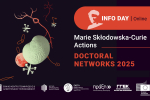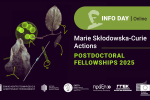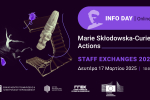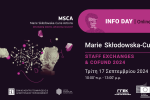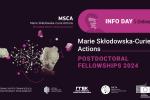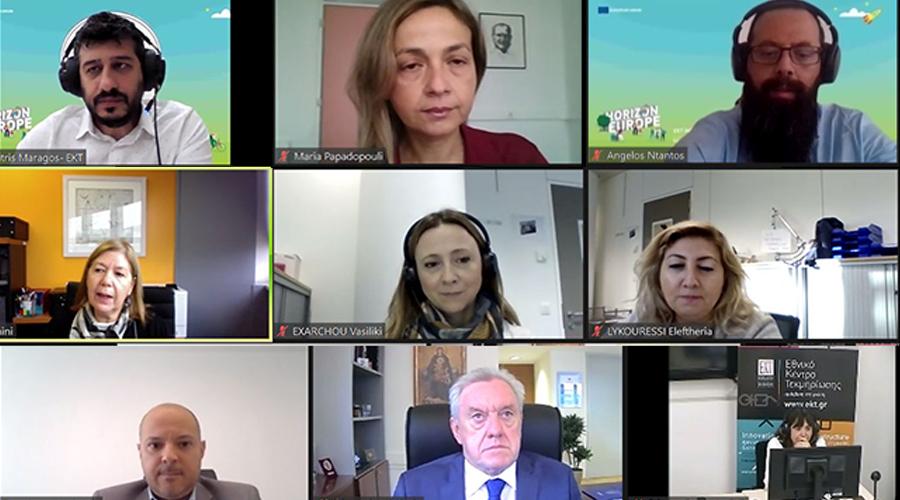
More than 300 researchers, professors and representatives of scholarship institutions from Greece, Cyprus and abroad participated in the online event 'New calls for staff exchanges and co-financing through the Marie Skłodowska-Curie Actions' on Tuesday 9th of November 2021. Speakers from the European Commission, successful project co-ordinators and National Contact Points presented certain actions of Horizon Europe's MSCA programme. The event was organised by the National Documentation Centre (EKT) and the Research and Innovation Foundation of Cyprus (RIF), National Contact Points for MSCA actions, in collaboration with the General Secretariat for Research and Innovation (GSRI), the European Commission (DG EAC) and the Research Executive Agency (REA).
The speakers focused on the new calls for Staff Exchanges and Co-financing (COFUND) under the Marie Skłodowska-Curie Actions (MSCA) programme. These actions promote and enhance interdisciplinarity, innovation and synergies between organisations, researchers and businesses. The audience consisting mainly of Greek and Cypriot academic and research institutions, companies and institutions that provide scholarships also included researchers, doctoral candidates, doctorate holders and postdoctoral fellows, and faculty members from all research fields.
The participants attended detailed presentations by representatives of the European Commission, beneficiaries of the Programme and National Contact Points in Greece and Cyprus, and put their questions directly. The event was initiated by EKT Director, Dr. Evi Sachini, who referred to the flagship MSCA Actions, from its inception in 1996 until today, and the ongoing support provided by EKT to researchers when submitting their proposals and networking. She pointed out that the MSCA act as a deterrent to the departure of specialised scientific personnel from the EU and as bridging the gap between research and entrepreneurship in Greece.
In his welcoming speech, Theodoros Loukaidis, General Director of RIF, talked about the importance of research personnel, who are at the heart of MSCA Actions, while also referring to the synergies developed by EKT and RIF to support the research and innovation ecosystems of the two countries. Cyprus, he pointed out, performed particularly well in the MSCA Actions in the previous Horizon 2020 Framework Programme.
Athanasios Kyriazis, Secretary General of Research and Innovation, pointed out not only the strengthening of outreach and co-operation, but also the transformation of the Greek and European ecosystem of research and innovation through the MSCA Actions. As Mr. Kyriazis stated, the EU research and innovation programmes, and especially the MSCA, have succeeded in creating added value through 'brain circulation' in Europe, while Greece's participation in EU research and innovation programmes has been considerable.
The floor was then given to Eleftheria Lykouresi and Dr. Vasiliki Exarchou, from the European Research Executive Agency (EREA), who presented the Staff Exchanges. The 5 Actions of the MSCA Programme (Staff Exchange, COFUND, Doctoral Networks, Postdoctoral Fellowships, MSCA and citizens) were presented and a detailed explanation was given of the objectives, duration, inclusion criteria, conditions and funding categories of the Staff Exchanges Action. Particular emphasis was placed on explaining interdisciplinarity, synergies and dissemination of results when drafting the funding proposal. It has become clear that National Contact Points play a key role in guiding and supporting researchers who wish to submit proposals.
Then, Professor Maria Papadopouli from the Institute of Technology and Research (FORTH) and the University of Crete, beneficiary of MSCA Actions and co-ordinator of the RISE neuronsXnets project, presented her personal journey in the world of research. Through the opportunity given to her by the MSCA, she succeeded in forming a consortium with academic and non-academic bodies from Europe and third countries such as the USA, with a network of excellent scientists from different scientific fields, in order to conduct an in-depth study of a research topic which required synergies from various sciences. During her presentation she gave a list of best practices and gave important advice for submitting proposals.
Dr. Cristina Pascual from EKT presented the overall activities of the organisation as far as supporting the research, academic and business community. She gave an overview of EKT's activity as a National Contact Point for Marie Sklodowska-Curie Actions in Horizon Europe with more than 5,000 participants in the events it has organised and more than 250 consulting services provided for these actions. Dr. Angelos Dantos from RIF presented the range of support services they provide organisations and researchers in Cyprus interested in participating in the MSCA Programme, as well as the impressive statistics of Cypriot participation in the previous Horizon 2020 Framework Programme.
The attributes of the MSCA COFUND Action were presented by Alexandra Pedersen, COFUND Call Co-ordinator from the European Research Executive Agency with extensive reference to its objectives, the structure of the participating organisations, the funding conditions, the duration, as well as the differences of the Programme in relation to Horizon 2020. She pointed out that new cost categories have been added to include additional research needs.
Dr. Marios Dimitriadis, Director of the Research and Innovation Support Service of the University of Cyprus and Executive Director of the European Office of Cyprus, shared his personal experience, referring to the ONISILOS project for which he received funding through the MSCA-COFUND action. The project transformed the doctoral programme in Cyprus, enhanced interdisciplinary and high quality research, entrepreneurship and the transfer of know-how, attracted excellent researchers and distinguished scientists were retained in Cyprus.
The event was co-rdinated by Dimitris Maragos, National Contact Point for MSCA Actions and Communication Officer of the 'Knowledge and Partnership Bridges' Initiative implemented by EKT.
Throughout the event, the audience was able to put live questions to the speakers, which were answered at the end of the presentations. In addition, participants took part in interactive polls about their field of science, submission of proposals, and their satisfaction with the webinar.
You can watch the video of the event here and the presentations that took place here.
You can find the COFUND calls here, the Staff Exchanges calls here, and can submit your application to the respective ractions.
Marie Skłodowska-Curie Actions (MSCA)
The Marie Skłodowska-Curie Actions, with a budget of around € 6.6 billion (2021-2027), seek to meet the European goal of a strong, resilient, flexible and creative human resource base with the right combination of skills able to meet the future needs of the labour market and innovate. During the period 2014-2020, the Horizon 2020 programme supported more than 65,000 researchers in Europe and worldwide, and funded more than 1,000 leading international doctoral networks.
The Staff Exchanges Action aims to develop international, cross-sectoral and interdisciplinary sustainable collaboration in the field of research and innovation, and contributes to the transformation of ideas into innovative products, services or processes. The COFUND Action co-finances new or existing doctoral programmes and postdoctoral fellowship programmes in EU Member States or associated countries of the Horizon Europe programme with the aim of disseminating MSCA best practices. It includes international, cross-sectoral and interdisciplinary research training, as well as international and cross-sectoral mobility of researchers at all stages of their careers.
EKT as National Contact Point of Horizon Europe
EKT is the National Contact Point for Horizon Europe, specifically the Marie Skłodowska-Curie Actions (MSCA) programme of Pillar 1 and the 'Health' and Digital Technologies, Industry and Space' sectors of Pillar 2 . It supports organisations, enterprises, academics and research organisations in identifying funding opportunities, drafting and submitting proposals, implementing projects and exploiting research results. In addition, it contributes to the recording and analysis of Greece's participation in European research and innovation programmes. As a National Contact Point, it supports the implementation of ongoing projects under Horizon 2020.
At the same time, utilising the capabilities of the Enterprise Europe Network, the largest business support network in the world, EKT supports the resilience and growth of Greek companies and organisations, providing networking services, technology transfer and innovation, and advisory guidance on access to European funding and locating opportunities for international co-operation.
Research and Innovation Foundation of Cyprus
The Research and Innovation Foundation (RIF) is the national body responsible for supporting and promoting research, technological development and innovation in Cyprus. It is responsible for co-ordinating the participation of Cyprus in European research and innovation activities such as the EU Framework Programmes, the COST Programme, the EURAXESS Network, the Enterprise Europe Network, etc. Since 1999, RIF has hosted a central system of the Cyprus National Contact Points for EU Framework Programmes, including Horizon Europe. In addition, RIF offers high quality services to the national research and business community such as information and guidance during the preparation of project proposals (information events, training seminars, workshops, preliminary and full proposal tests, mock interviews, etc.), as well as during the management of funded projects.









